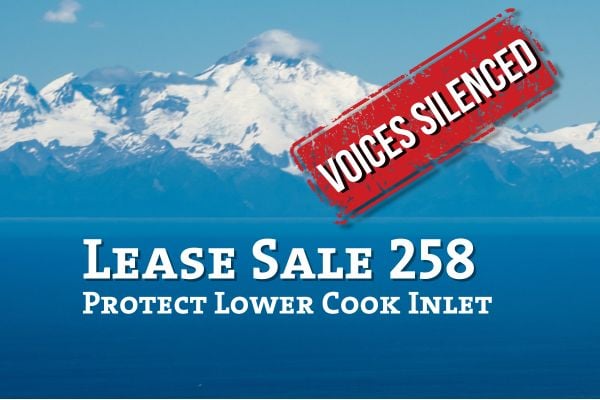Federal regulators at the Bureau of Ocean Energy Management (BOEM) are moving to finalize Cook Inlet oil and gas Lease Sale 258 without public hearings or opportunities for comment on a more thorough environmental review ordered by a federal court.
A federal judge ruled in 2024 that BOEM’s initial review of Lease Sale 258 violated the National Environmental Policy Act (NEPA) by failing to adequately assess alternatives that could minimize impacts and threats specific to Cook Inlet’s critically endangered beluga whale population. The court ordered BOEM to prepare a Supplemental Environmental Impact Statement (SEIS) and suspended Hilcorp’s lease until the review was complete.
Now, in an unprecedented move, BOEM claims it will finalize the process by the end of the year without holding hearings and without giving community members, tribes, and stakeholders any chance to weigh in. While regulatory environmental rollbacks have given agencies discretion around whether to include public participation, BOEM’s decision to exclude the public starkly contrasts with how the government has conducted NEPA processes for the last 50 years and undermines the spirit of the court’s ruling.
Alaskans have always stood against the industrialization of Lower Cook Inlet. Our community created Cook Inletkeeper 30 years ago to watchdog and defend our waters against actions precisely like the one BOEM is now taking. If we allow this administration’s BOEM to shut Alaskans out of decisions about their own waters this time, they’ll do it again and again. With Lower Cook Inlet lease sales already planned annually from 2026 to 2030, we need to ensure this precedent isn’t set now.
What is at Stake for Cook Inlet | Tikahtnu
Industrializing Lower Cook Inlet would bring profound and lasting changes. While the Upper Cook Inlet is already highly industrialized, platforms, pipelines, and industry activity will be a new source of visual, sound, water, and air pollution to the relatively pristine waters of Lower Cook Inlet. This pollution, both accidental and permitted, will diminish healthy habitat and livable futures for salmon, halibut, belugas, and people alike. Among our top concerns:
- Pollution will Intensify: Cook Inlet offshore oil and gas production is the only extraction site in the country that receives a waiver from the EPA to discharge their industrial effluent without treatment directly back into local waters. This EPA exemption will likely be applied in the federal waters of Lower Cook Inlet as well.
- Every oil spill begins with a lease sale: The current draft EIS predicts a 19% chance that one or more large oil spills (more than 42,000 gallons) will occur. Sea conditions, ice, temperatures, high waves, large tides, and currents would hinder clean-up efforts.
- Fossil Fuel Dependence: While it won’t be produced fast enough to alleviate our immediate energy shortage, developing lower Cook Inlet Oil and Gas will lock in our dependence on fossil fuels for years to come, exacerbating climate change and making it systemically more difficult for us to diversify with renewables.
- Climate Change: Expanding oil and gas into lower Cook Inlet is set to be a major contributor to climate change. The Bureau of Ocean Energy Management’s (BOEM) own environmental analysis estimates drilling operations and consumption of extracted oil and gas could emit 88.3 million tons of carbon dioxide over the next three decades—about the equivalent of a year’s worth of emissions from 19 million cars.
Take Action by signing our petition to BOEM, calling for the public process to be reinstated. Alaskans deserve to have a seat at the table. Allowing for oil and gas extraction in Lower Cook Inlet risks the health and well-being of the local economy and the marine environment, which our regional economy relies on. The decision to bypass public comments and hearings deprives Cook Inlet residents and all Americans of their rightful role in federal decision-making. Public involvement leads to better outcomes. The people who study and utilize these waters, be it for commercial fishing, tourism, recreation, or subsistence, understand the risks and ways to mitigate those risks best.

